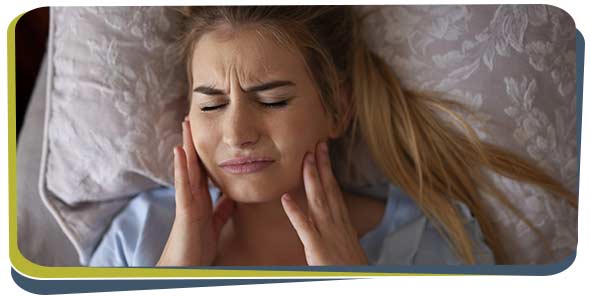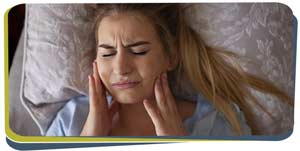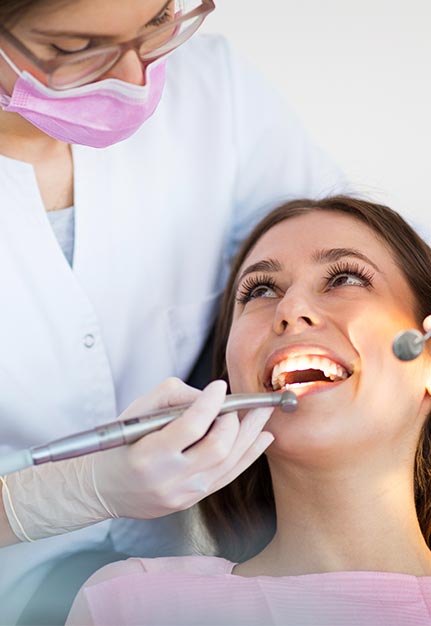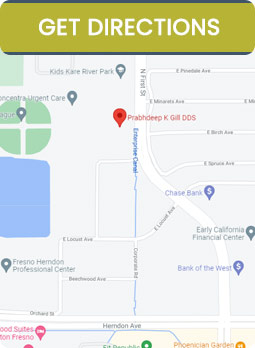Bruxism Treatment in Fresno, CA: Relieve Teeth Grinding and Jaw Pain
Prabhdeep K Gill, DDS, offers effective bruxism treatment in Fresno, CA, addressing teeth grinding and jaw pain with personalized care. Utilizing advanced diagnostic tools and custom solutions like night guards, she tailors treatments to each patient’s unique needs. With over a decade of experience, Dr. Gill is committed to restoring comfort and functionality to your smile. Contact us for more information, or request an appointment online today! We are conveniently located at 7215 N First St Suite 107 Fresno CA 93720.


Table of Contents:
What is bruxism?
What is the main cause of bruxism?
What are the symptoms of bruxism?
Can bruxism be cured?
Bruxism is an incredibly common condition that many people won’t even realize they have developed, as it can be directly tied to external factors such as emotional well-being. To ensure that either you don’t have sleep bruxism or that you are made aware of it before pain develops, visiting a dentist regularly will help to ensure that it is diagnosed early and treatments are available to avoid its development. Up to 30% of the population will experience bruxism at some point in their lives, as it is related to improper management of different emotions, including stress and anxiety. If you frequently have a sore jaw, have noticed that the tips of your teeth have started to flatten, or your significant other has mentioned hearing what sounds like you grinding your teeth in your sleep, ask your dentist about bruxism at your next check-up.
Bruxism is a common condition that involves the grinding, clenching, or gnashing of your teeth. This can occur when you’re awake (known as awake bruxism) or subconsciously while you are asleep (also referred to as sleep bruxism). In most cases, it is not a severe condition and may just cause some minor wearing down of the teeth or a sore jaw from regular tensed movement. However, severe cases can lead to significant damage to your teeth or jaw, regular headaches similar to tension headaches, significant pain experienced in the face and jaw, and the development of temporomandibular joint disorder (TMJ).
There isn’t necessarily one particular cause of bruxism, it is often the result of many genetic, psychological, and physical influences. Some factors that could lead to awake bruxism include experiencing stress, anxiety, anger, frustration, and tension, or could be a habit developed during times of deep concentration. Sleep bruxism can be caused by a chewing activity that is only sleep-related and is associated with sleep arousals. Many other risk factors that can increase the chances of someone developing bruxism include:
● Stress: An increase in stress, anxiety, anger, or frustration may cause bruxism.
● Age: Bruxism is more common in younger children and is likely to go away with age.
● Personality: Those who are typically more aggressive, competitive, or hyperactive are more likely to develop bruxism.
● Medications: Some medications include bruxism as a possible side effect.
● Other substances: Consumption of substances such as tobacco, alcohol, caffeine, or recreational drugs can increase the risk of bruxism.
● Genetics: Bruxism has been shown to be more common in those who have a family history.
● Other medical disorders: Bruxism is often seen alongside Parkinson’s disease, dementia, epilepsy, night terrors, and more.
While many people are not aware that they have bruxism until the condition leads to other issues, the most commonly noticed symptoms are grinding teeth or clenching the jaw loudly enough to be noticed by those around you, both while awake and asleep. If someone has more severe bruxism and has had it for a while, they could have flatter teeth that are maybe fractured, loose, or chipped, worn down the enamel on the teeth, and experience pain or sensitivity in their teeth. As bruxism also often involves frequent clenching and movement of the jaw, some symptoms include having sore, tired, or tight muscles surrounding the jaw, neck, or face, or even a locked jaw. It can also lead to frequent dull headaches or pain in the area around the temples that feels like an earache. Sleep bruxism can also cause patients to suffer from disruptive periods of sleep. You can reach out to our expert dentists today to learn more about this treatment and our services.
Most cases of bruxism are mild and occur in young children, so even without treatment, the child will likely grow out of the condition without any consequences. However, if the bruxism is more severe and causes discomfort or pain, there are a few methods of treatment to alleviate symptoms and possibly cure the condition. Some possible treatments include wearing a mouth guard at night (only alleviates symptoms until the cause is treated), accessing dental treatment for severe damage done to teeth, Mental health care to manage the psychological causes of bruxism, and treating the disorder or condition that has caused the bruxism. For more information, contact us or request an appointment online today! We are conveniently located at 7215 N First St Suite 107 Fresno CA 93720. We serve patients from Clovis CA, West Park CA, Mayfair CA, Muscatel CA, Burness CA, Lone Star CA, and surrounding areas.
Check Out Our 5 Star Reviews


Additional Services You May Need
▸ Cosmetic Dentistry
▸ Dental Implants
▸ Crowns & Bridges
▸ Invisalign
▸ Tooth Restoration
▸ Maxillofacial Surgery
▸ Prosthodontics
▸ Dental Checkups and Cleaning
▸ Teeth Whitening
▸ Oral Cancer Screening
▸ Veneers
▸ Tooth Replacement
▸ Gum Disease
▸ Sports Guards
▸ Bruxism
▸ Night Guard
▸ Gingivitis Treatment
▸ Fillings
▸ Dentures
▸ Preventative
▸ Dental Emergencies
▸ General Dentistry
▸ Digital X-Rays







